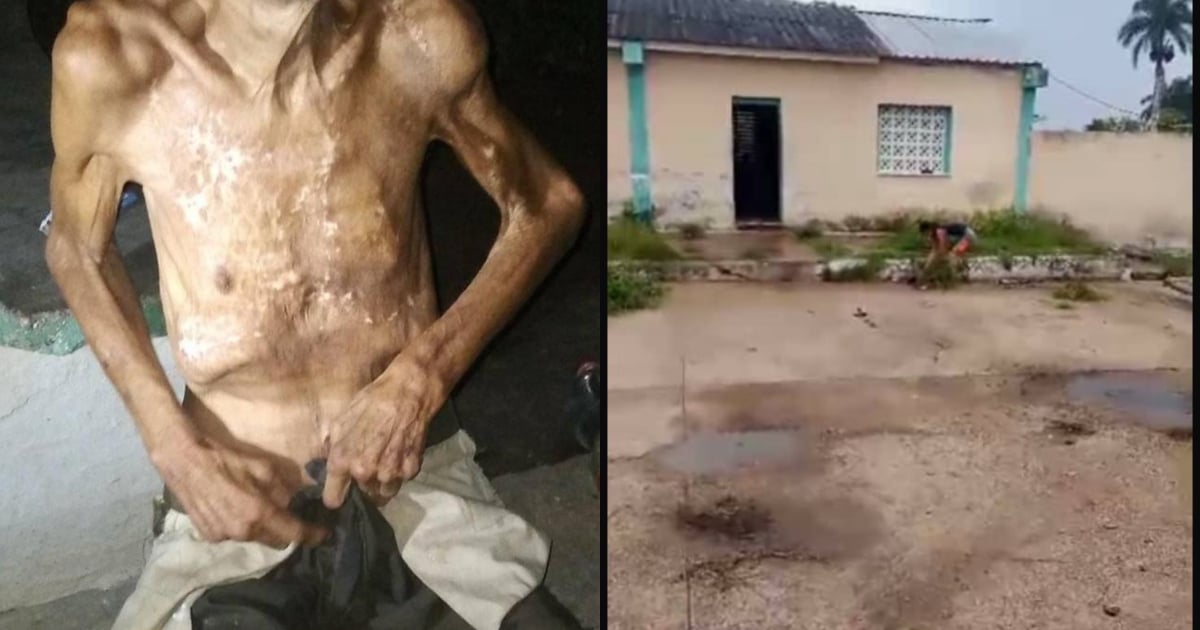The situation at the psychiatric hospital in Placetas (Villa Clara) is nothing short of a horror story. This is how two family members of patients confined in this hospital describe it. The center was supposed to be dismantled and relocated to Corralillo, about 120 kilometers away, but several families opposed the move due to the country's transportation difficulties, making it nearly impossible for them to visit their relatives. The relocation was left incomplete, and nothing that was taken has been returned or replaced, further worsening the hospital's conditions.
"The patients weren't moved to Corralillo, but the beds were. They took the toilets, the chairs where they rested, the televisions, the water installation, the pipes... They stole the turbine, and even though the police found it, the water installations never came back and no one knows where they ended up," explains a family member.
"It's a concentration camp," states another Cuban who prefers to remain anonymous to avoid repercussions against her family member, who is admitted in the hospital. In the last week, they have gone several days without drinking water. Visitors have found their relatives dirty, with remnants of feces and urine on their bodies and clothes; without pajamas because the seamstress hadn't come to make the strips needed to tie them.
"It's an infernal place, surrounded by pastures, and there's nowhere to ask for a glass of water. There's nothing there. No washing machines, and without water or staff to wash, imagine that," she adds.
Dire Conditions and Lack of Transparency
Previously, the hospital housed 70 people, but now only 30 remain, and no one knows if the missing 40 have died or have been moved elsewhere. Many of those who remain are bedridden. "People are dying there," she emphasizes.
The head of the psychiatric hospital, Sule Ribera, does not allow family members to enter to prevent them from seeing the dire conditions of the patients. Additionally, she has been seen taking a fan, claiming it was broken and she was taking it home to fix it. Family members have also caught an administrator taking a piece of beef, unlike the scraps given to the patients. "Because they are mentally ill, no one cares," a woman with a relative in the hospital remarks.
Sule Ribera was transferred to the psychiatric hospital from the General Hospital, where she was accused of selling medications to patients. At the psychiatric facility, she has had confrontations with some workers, even physically assaulting one of them.
Many of the psychiatric patients in Placetas have no teeth to chew the tough meat and boiled green bananas they are given when visitors are present. There is no blender to make them a puree, leaving many patients looking emaciated. "This is now much worse than during the 'Special Period'," insists the same source. One family complained to the Provincial Directorate of Public Health, the Government, and the municipal PCC, only to find that instead of ex-convicts hired as guards beating the escaping patients, there are now police officers preventing family members from entering the hospital.
"The bathrooms are so slippery with slime that patients fall inside. It's horrible," reiterates this family member, convinced that the mentally ill in Placetas are confined in "a concentration camp."
Key Issues at Placetas Psychiatric Hospital
To provide further clarity on the critical situation at the Placetas Psychiatric Hospital, we have compiled a set of relevant questions and answers.
What is the current condition of the psychiatric hospital in Placetas?
The hospital is in a dire state, with severe water shortages, lack of basic facilities, and poor living conditions for the patients.
Why was the hospital supposed to be relocated to Corralillo?
The center was intended to be moved to Corralillo to presumably improve conditions, but the relocation was left incomplete, causing further deterioration of the hospital’s facilities.
Who is Sule Ribera and what role does she play in this situation?
Sule Ribera is the head of the psychiatric hospital. She has been accused of preventing families from seeing the poor conditions and has a history of misconduct, including selling medications and physically assaulting workers.
What actions have been taken by families and authorities to address the issues?
Families have complained to the Provincial Directorate of Public Health, the Government, and the municipal PCC, but the only result has been the replacement of ex-convict guards with police officers to prevent family members from entering the hospital.
